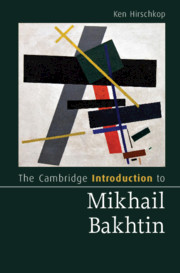Book contents
- The Cambridge Introduction to Mikhail Bakhtin
- The Cambridge Introduction to Mikhail Bakhtin
- Copyright page
- Contents
- Acknowledgements
- A Note on the Translations
- Chronology
- Abbreviations
- Chapter 1 Introduction
- Chapter 2 Life
- Chapter 3 Context
- Chapter 4 Works
- Chapter 5 Reception
- Chapter 6 A Brief Conclusion
- Notes
- Further Reading
- Index
Chapter 6 - A Brief Conclusion
Published online by Cambridge University Press: 21 October 2021
- The Cambridge Introduction to Mikhail Bakhtin
- The Cambridge Introduction to Mikhail Bakhtin
- Copyright page
- Contents
- Acknowledgements
- A Note on the Translations
- Chronology
- Abbreviations
- Chapter 1 Introduction
- Chapter 2 Life
- Chapter 3 Context
- Chapter 4 Works
- Chapter 5 Reception
- Chapter 6 A Brief Conclusion
- Notes
- Further Reading
- Index
Summary
In a famous article reflecting on his own position within the sciences, Jürgen Habermas proposed that philosophy should take its existing role of intellectual usher – showing each science to its assigned seat – and ‘exchange it for the part of stand-in (Platzhalter)’. By this he meant that philosophy could serve as a sort of avant-garde, proposing radical ideas, inspired by scientific problems but not yet supported by evidence, that would eventually be taken up by ‘empirical theories with strong universalist claims’. His examples of such ideas were Freud’s explanation of symptom formation through repression, Durkheim’s idea of the sacred as producer of solidarity, and Chomsky’s argument that language acquisition was a kind of hypothesis-testing. Each of these thinkers (along with Weber and Piaget) ‘inserted a genuinely philosophical idea like a detonator into a particular context of research’, forever changing the field. There have been many arguments about what kind of intellectual Bakhtin was – philosopher, literary critic, cultural theorist? – and whether we should value him for his philosophical contributions or for making more modest, but more solid, contributions to the theory of language or literature. Habermas’s shrewd suggestion may provide an answer that makes everyone happy. For Bakhtin was the classic philosopher as stand-in, inserting some genuinely philosophical ideas like detonators into fields of research.
- Type
- Chapter
- Information
- The Cambridge Introduction to Mikhail Bakhtin , pp. 159 - 160Publisher: Cambridge University PressPrint publication year: 2021



